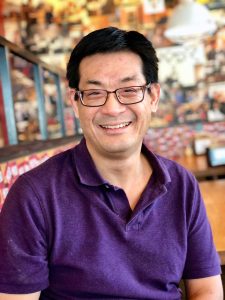 Guest post by empowered patient Howard Chang. See bio at end.
Guest post by empowered patient Howard Chang. See bio at end.
I’m a highly engaged patient advocate who has faced many challenges. To my unhappy surprise, the coronavirus pandemic and lockdown has revealed once again how much I still struggle with the need to be in control. Like everyone, I don’t like our situation, but because of my life experience I am prepared to be tough. I’ve learned two traits that are essential to e-patients facing challenges at the frontier of knowledge: courage and resilience.
As a child, and now an adult, I’ve always struggled for control. And so, as long as I can remember I’ve wanted to control my environment and future. I attribute this trait to a chaotic upbringing. Outside of my home I experienced bullying for being Chinese American and having the severe, chronic skin diseases psoriasis and eczema. Inside the home I felt unsafe for reasons I won’t go into detail here.
The chaos from my immediate environment seeped into my heart in a way that led me to feel insecure and anxious. The coronavirus pandemic and lockdown has revealed once again how much I still struggle with the need to be in control…
Longing for order in chaos
A confirmed psoriasis diagnosis at age eight changed my life forever. I missed school three days each week to go to the clinic for phototherapy treatments. Nobody explained why I needed to wear special goggles in the light booth, or how the smelly tar ointment I slept in overnight helped my skin.
I wish someone had warned me how much the unpredictability of chronic disease would burden me for decades to come. Or how it would become symbolic of a lifelong struggle to find order in the mess of life.
As I entered my teenage years, I began to make more decisions for myself. I naturally sought to limit uncertain outcomes and surprises. Of course, I couldn’t control everything, so I focused on a few areas. I became a straight-A student, preparing tirelessly so I could do the best on the exam. I avoided awkward social situations.
In college I took classes designed to my academic strengths. I sidestepped courses that required oral presentations or long papers, opting for problem sets. That way I could minimize the ambiguity of subjective grading.
Even though at times my psoriasis spread out of control all over my body, I diligently did what my doctor prescribed. At least that much I could control.
Addressing the lack of control
In 2011 I finally asked a therapist why I felt so angry and anxious about what I could not control. He helped me see the ineffective ways I coped with the insecurity and fears. Some negative habits I could attribute to poor coping skills such as becoming upset with others who did not do what I wanted. But my strong drive to control outcomes and avoid risky situations appeared to directly correlate with my internal struggles.
A great example of my need for control came up in a therapy session. I planned to join my mentor on a trip to the UK to explore starting a project there. I had so many questions. Would my skin hold up on an international trip? Would I adapt to a new culture? Would I meet my mentor’s expectations?
I wanted to know how to best approach the anxiety inducing situation. My therapist told me I needed courage and resilience.
Discovering courage and resilience
As I look back on an incredible and productive trip to England a decade ago, I’m struck by my therapist’s insight. Since I couldn’t control my environment, I needed to change how I faced that uncertain and fearful situation. He challenged me to summon inner strength to calm my fears so I would not falter at the first sign of trouble.
Since then I’ve thought a lot about what it means to be resilient. I don’t always initially respond well to uncertainty and unpredictability. But I’ve trained myself to look more at how well I bounce back from those difficult moments. In other words, it’s not the getting knocked down I worry about, but how quickly I get back up.
Living with chronic illness has provided ample opportunities to flex the courage and resilience muscles. Recently, I sustained a burn on my skin from phototherapy overexposure that flared my psoriasis. With the coronavirus spreading in the community, I questioned if I should go to the clinic. My dermatologist instead gave me directions on how to treat the burn at home over the online patient portal.
I spent the next four weeks managing the skin burn while figuring out how to conduct daily life in a pandemic. That situation made me dig deep once again to find the courage and resilience my therapist talked about.
Uncertainties about health, future plans, and career will always be with me. Adding on fears of getting sick with COVID-19 and what happens next in our society makes doing so that much more urgent. It’s a daily struggle, and I am genuinely fatigued like so many others with lockdown measures and now what happens as we open the economy back up.
I remind myself in moments like these that I’m no longer that child afraid in the phototherapy booth. I am no longer that college student living under the illusion that I can control my academics and career path. Rather, I look to find order from within amidst the chaos I know I will never be able to control. And as I do, I cherish the value of carrying courage about the unknown, which is fortified by being resilient when unwanted things happen. Together they help me achieve what’s important to me. And that is the difference between being an empowered patient or powerless.
About the author
Howard Chang is an active psoriasis advocate and blogger who shares his journey living with chronic illness on his website PsoHoward and his Everyday Health featured column The Itch to Beat Psoriasis. WEGO Health named him a a 2018 Top 10 Lifetime Achievement Patient Leader in recognition of his patient advocacy efforts. He also volunteers for the National Psoriasis Foundation and works as an ordained minister in the greater Sacramento, CA area. Twitter: @hchang316







Recent Comments